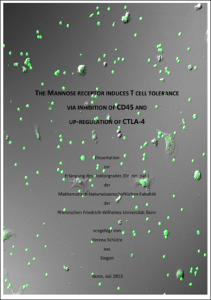Schütte, Verena: The Mannose receptor induces T cell tolerance via inhibition of CD45 and up-regulation of CTLA-4. - Bonn, 2014. - Dissertation, Rheinische Friedrich-Wilhelms-Universität Bonn.
Online-Ausgabe in bonndoc: https://nbn-resolving.org/urn:nbn:de:hbz:5n-35347
Online-Ausgabe in bonndoc: https://nbn-resolving.org/urn:nbn:de:hbz:5n-35347
@phdthesis{handle:20.500.11811/6054,
urn: https://nbn-resolving.org/urn:nbn:de:hbz:5n-35347,
author = {{Verena Schütte}},
title = {The Mannose receptor induces T cell tolerance via inhibition of CD45 and up-regulation of CTLA-4},
school = {Rheinische Friedrich-Wilhelms-Universität Bonn},
year = 2014,
month = mar,
note = {The present study proves that the mannose receptor (MR) bears beside its function as endocytic receptor a second responsibility namely the induction of tolerance.
The results of our experiments show that the decision, whether this immune-suppressive effect is carried out depends on the inflammatory status of the surrounding milieu. Whereas at steady-state conditions the MR has a tolerogenic effect during activation of CD8+ T cells, this suppressive phenotype is overcome under inflammatory conditions. Thereby, the MR resembles a molecular switch between tolerance induction on the one hand and allowance or even mediating immunity by antigen-uptake on the other hand.
The investigations of this thesis shed light into the underlying molecular mechanism of the MR-mediated induction of tolerance. The MR on DCs can bind to the tyrosine phosphatase CD45 on the T cell surface. This interaction leads to inhibition of its phosphatase activity, which is responsible for a reduced cytotoxic capacity of activated CD8+ T cells. The executive molecule in this process is the inhibitory protein cytotoxic T-lymphocyte antigen 4 (CTLA-4), being up-regulated upon inactivation of CD45.
After maturation of the DCs with the inflammatory molecule CpG, the immune suppressive effect of the MR is overcome and a robust immune response is initiated. The findings of this study pinpoint this effect to the abolished expression of CTLA-4. It is furthermore shown that signaling events via the co-stimulatory molecule CD28 are sufficient to suppress CTLA-4 up-regulation. Hence, a potent cytotoxic CD8+ T cell response is induced.
Finally, it can be demonstrated that the tolerogenic effect of the MR as well as its molecular mechanism also holds true in vivo.},
url = {https://hdl.handle.net/20.500.11811/6054}
}
urn: https://nbn-resolving.org/urn:nbn:de:hbz:5n-35347,
author = {{Verena Schütte}},
title = {The Mannose receptor induces T cell tolerance via inhibition of CD45 and up-regulation of CTLA-4},
school = {Rheinische Friedrich-Wilhelms-Universität Bonn},
year = 2014,
month = mar,
note = {The present study proves that the mannose receptor (MR) bears beside its function as endocytic receptor a second responsibility namely the induction of tolerance.
The results of our experiments show that the decision, whether this immune-suppressive effect is carried out depends on the inflammatory status of the surrounding milieu. Whereas at steady-state conditions the MR has a tolerogenic effect during activation of CD8+ T cells, this suppressive phenotype is overcome under inflammatory conditions. Thereby, the MR resembles a molecular switch between tolerance induction on the one hand and allowance or even mediating immunity by antigen-uptake on the other hand.
The investigations of this thesis shed light into the underlying molecular mechanism of the MR-mediated induction of tolerance. The MR on DCs can bind to the tyrosine phosphatase CD45 on the T cell surface. This interaction leads to inhibition of its phosphatase activity, which is responsible for a reduced cytotoxic capacity of activated CD8+ T cells. The executive molecule in this process is the inhibitory protein cytotoxic T-lymphocyte antigen 4 (CTLA-4), being up-regulated upon inactivation of CD45.
After maturation of the DCs with the inflammatory molecule CpG, the immune suppressive effect of the MR is overcome and a robust immune response is initiated. The findings of this study pinpoint this effect to the abolished expression of CTLA-4. It is furthermore shown that signaling events via the co-stimulatory molecule CD28 are sufficient to suppress CTLA-4 up-regulation. Hence, a potent cytotoxic CD8+ T cell response is induced.
Finally, it can be demonstrated that the tolerogenic effect of the MR as well as its molecular mechanism also holds true in vivo.},
url = {https://hdl.handle.net/20.500.11811/6054}
}






